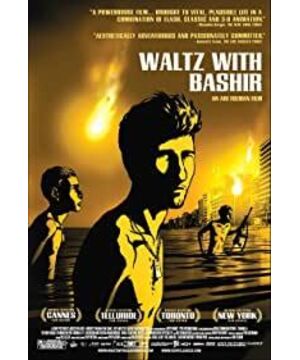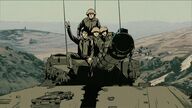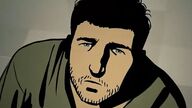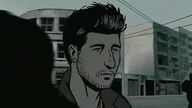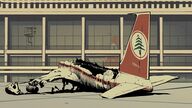But it can't get rid of the pale connotation, the rigid wounds under the artistic shape, the wounds that are unwilling to heal.
What the film tells is a reconstruction of the past, a few Israeli soldiers, forgetting and reminiscing about the 1982 Beirut Sabra Shatila refugee camp massacre. This is also an autobiography, directed by Ari Folman Israelis, who wrote about himself. He participated in this war a year ago. Twenty years later, his repeated nightmares evoked certain memories, which drove him to find his former comrades-in-arms and rebuild the fragments of the past that he did not know why he was lost.
As a person with amnesia, the protagonist suffers from Post-traumatic stress disorder (PTSD). Due to the huge trauma, he has a self-protection mechanism and forgets that traumatic memory by himself. Therefore, the director/protagonist has been traumatized and is also a victim. Recovering the memory of the victim is an important process of psychological rehabilitation. Making a movie is treatment, the protagonist said.
Ironically, the Israeli army is the strongest in the Middle East and the only regular army in the Lebanese War. If they are also victims of the Holocaust, who is the culprit? Who can have this strength? Is the wounded by the Israelis the strong and unable to protect the weak and old women and children close to them? No, since the amnesiar is the victim, the movie does not blame himself, only the acquiescence of the upper-level commander and the helplessness of the lower-level troops, and then it ends there.
Israel’s modern history always describes itself as a victim. Old comrades-in-arms asked the protagonist: Does Palestine refugee camp remind you of Nazi concentration camps? This tells how the collective memories of Israel are firmly fixed in the victim's own self. Is it true that Israelis can only feel the pain of others in their own pain?
The acquiescence of the Israeli leadership in the massacre was very obvious, and the Israeli army kept firing flares on the night of the massacre. The protagonist entered the refugee camp after the slaughterer's Phalanx gunners withdrew and saw the body of a curly-haired child who was about the same age as his daughter. Then he found corpses everywhere, and in some places, the corpses were stacked to the height of the chest. The screen shifts to real news footage, Palestinian women crying and crying, and the movie comes to a halt here. The director still failed to shed tears, and could only express sadness through the tears of others.
"Trauma not only does not create freedom, it also fails to open to the other and the fragmented and suspended self fragmentation, but will lead to a different fragmentation-in Freud's own terms, a kind of Being devastating at the same time makes identity self-defeating and heading towards a completely different path: the danger of walking towards dogma, coercion, and compulsive forms of belief. Are we risking the idealization of the flaws and cracks of identity? Fragments may become rigid, just Just as a nation may be alienated by history, not only does it not spread itself, but starts to dig into history to justify national violence.” ──Jacqueline Ross (2003), “Responding to Sayyid”, included in Edward Said (2003), "Freud and non-European descent".
Unfortunately, psychoanalysis cannot treat the pain that a bullet passes through the body of a loved one. In Gaza 26 years later, nightmares have repeatedly torn apart unhealed Wound.
Background information:
http://en.wikipedia.org/wiki/Sabra_and_Shatila_massacre
Introduction to Sabra and Shatila Massacre (Memorial to the Ruoxue Palestine Information Network)
"The massacre lasted overnight. Two refugee camps were formed In the slaughterhouse, the corpses of thousands of men, women, and children were scattered, some fell on the street, some were killed at home. Some men were tied up, chained together and dragged away on trucks, and some youths were cut off. The genitals were removed, some throats were cut off, some nipples were cut off, and people's heads were cut off. Some women clung to their babies and died..."
View more about Waltz with Bashir reviews


